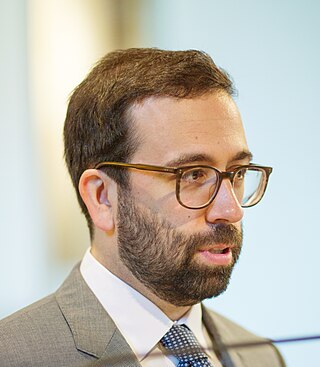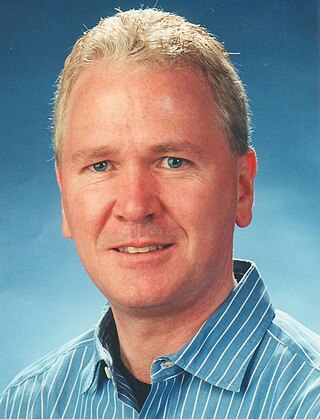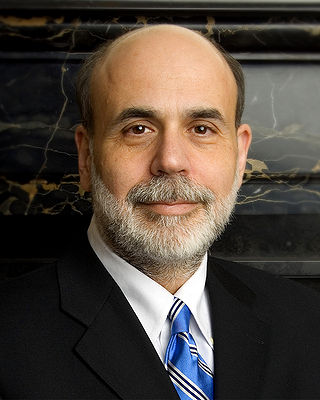Related Research Articles

Lawrence Henry Summers is an American economist who served as the 71st United States secretary of the treasury from 1999 to 2001 and as director of the National Economic Council from 2009 to 2010. He also served as president of Harvard University from 2001 to 2006, where he is the Charles W. Eliot university professor and director of the Mossavar-Rahmani Center for Business and Government at Harvard Kennedy School.

The Hoover Institution is an American public policy think tank and research institution that promotes personal and economic liberty, free enterprise, and limited government. While the institution is formally a unit of Stanford University, it maintains an independent board of overseers and relies on its own income and donations. It is widely described as a conservative institution, although its directors have contested the idea that it is partisan.
The Chicago school of economics is a neoclassical school of economic thought associated with the work of the faculty at the University of Chicago, some of whom have constructed and popularized its principles. Milton Friedman and George Stigler are considered the leading scholars of the Chicago school.

The University of Chicago Law School is the law school of the University of Chicago, a private research university in Chicago, Illinois. It is consistently ranked among the best and most prestigious law schools in the world, and has many distinguished alumni in the judiciary, academia, government, politics and business. It employs more than 180 full-time and part-time faculty and hosts more than 600 students in its Juris Doctor program, while also offering the Master of Laws, Master of Studies in Law and Doctor of Juridical Science degrees in law. The law school has the highest percentage of recent graduates clerking for federal judges.

James Bradford "Brad" DeLong is an economic historian who is a professor of economics at the University of California, Berkeley. DeLong served as Deputy Assistant Secretary of the U.S. Department of the Treasury in the Clinton Administration under Lawrence Summers.

Finn Erling Kydland is a Norwegian economist known for his contributions to business cycle theory. He is the Henley Professor of Economics at the University of California, Santa Barbara. He also holds the Richard P. Simmons Distinguished Professorship at the Tepper School of Business of Carnegie Mellon University, where he earned his PhD, and a part-time position at the Norwegian School of Economics (NHH). Kydland was a co-recipient of the 2004 Nobel Memorial Prize in Economics, with Edward C. Prescott, "for their contributions to dynamic macroeconomics: the time consistency of economic policy and the driving forces behind business cycles."

Ricardo A. M. R. Reis is a Portuguese economist and the A. W. Phillips professor of economics at the London School of Economics. In a 2013 ranking of young economists by Glenn Ellison, Reis was considered the top economist with a PhD between 1996 and 2004., and in 2016 he won the Germán Bernácer Prize for top European-born economist researching macroeconomics and finance. He writes a weekly op-ed for the Portuguese newspaper Jornal de Notícias and Expresso, and participates frequently in economic debates in Portugal.

Lawrence Henry White is an American economics professor at George Mason University who teaches graduate level monetary theory and policy. He is considered an authority on the history and theory of free banking. His writings support the abolition of the Federal Reserve System and the promotion of private and competitive banking.

Frederic Stanley "Rick" Mishkin is an American economist and Alfred Lerner professor of Banking and Financial Institutions at the Graduate School of Business, Columbia University. He was a member of the Federal Reserve Board of Governors from 2006 to 2008.
Morris M. Kleiner is an American academic. Kleiner received his M.A. in Labor and Industrial Relations, and Ph.D. in economics from the University of Illinois and his undergraduate degree in economics from Bradley University. He is a professor and the inaugural AFL-CIO chair in labor policy at the Hubert H. Humphrey School of Public Affairs at the University of Minnesota, Minneapolis. From 1974 to 1987 he was an assistant and later full professor at the School of Business at the University of Kansas.

William Poole was the eleventh chief executive of the Federal Reserve Bank of St. Louis. He took office on March 23, 1998 and began serving his full term on March 1, 2001. In 2007, he served as a voting member of the Federal Open Market Committee, bringing his District's perspective to policy discussions in Washington. Poole stepped down from the Fed on March 31, 2008.
Frederic Michael Scherer is an American economist and expert on industrial organization. Since 2006, he continues as a professor of economics at the JFK School of Government at Harvard University.

Rebel A. Cole is the Lynn Eminent Scholar Professor of Finance in the College of Business at Florida Atlantic University in Boca Raton, Florida, where he has taught since August 2016. He teaches graduate-level classes in corporate finance and financial institutions.

Douglas Warren Diamond is an American economist. He is currently the Merton H. Miller Distinguished Service Professor of Finance at the University of Chicago Booth School of Business, where he has taught since 1979. Diamond specializes in the study of financial intermediaries, financial crises, and liquidity. He is a former president of the American Finance Association (2003) and the Western Finance Association (2001-02).
Martin Stewart Eichenbaum is the Charles Moskos professor of economics at Northwestern University, and the co-director of the Center for International Economics and Development. His research focuses on macroeconomics, international economics, and monetary theory and policy.
Leland Lawrence Briggs was an American accounting scholar, and Professor at the University of Vermont, known as founder of The Accountants Digest, which he edited and published until 1973.
James A. Wilcox is a former James J. and Marianne B. Lowery Chair and professor of economics at Haas School of Business, University of California, Berkeley.
Benjamin Felt Jones is an American economist and professor at the Kellogg School of Management, Northwestern University. Jones's research is mainly focused on innovation and economic development. He has worked as an economic advisor in the U.S. Treasury and the White House.
The Department of Economics is an academic department of the University of Oxford within the Social Sciences Division. Relatively recently founded in 1999, the department is located in the Norman Foster-designed Manor Road Building.

The 2022 Nobel Memorial Prize in Economic Sciences was divided equally between the American economists Ben S. Bernanke, Douglas W. Diamond, and Philip H. Dybvig "for research on banks and financial crises" on 10 October 2022. The award was established in 1968 by an endowment "in perpetuity" from Sweden's central bank, Sveriges Riksbank, to commemorate the bank's 300th anniversary. Laureates in the Memorial Prize in Economics are selected by the Royal Swedish Academy of Sciences. The Nobel Committee announced the reason behind their recognition, stating:
"This year’s laureates in the Economic Sciences, Ben Bernanke, Douglas Diamond and Philip Dybvig, have significantly improved our understanding of the role of banks in the economy, particularly during financial crises. An important finding in their research is why avoiding bank collapses is vital."
References
- ↑ Pat Vaughan Tremmel (February 18, 2006). "Christiano named Alfred W. Chase Professor in Business Institutions". Northwestern University. Retrieved October 5, 2019.
- 1 2 [s.n.] (July 2022). Lawrence J. Christiano: Vita.
- 1 2 "Lawrence J. Christiano". Federal Reserve Bank of Minneapolis. Retrieved October 5, 2019.